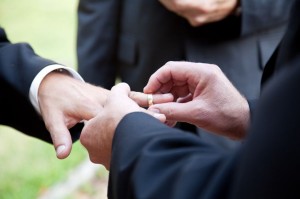Alabama Loopholes Marriage Equality
 Photo by lisafx / 123RF
Photo by lisafx / 123RF Soon, marriage licenses may no longer be required to get married in Alabama. If the bill SB-13 passes, marriage licenses will be replaced with affidavits filed with the local probate judge acknowledging that a marriage has taken place. Not only would this bill eliminate marriage licenses, it would also eliminate the ceremonial component that is currently required in order to be legally married in Alabama. While the bill appears to both promote the separation of church and state and prevent probate judges from discriminating against LGBTQ couples by choosing not to issue them a marriage license, it actually rewards non-compliant probate judges and punishes LGBTQ couples in the long run.
For the third year in a row, Greg Albritton, a state senator from Conecuh County, has introduced a bill similar to SB-13 changing Alabama’s marriage laws and probate judges’ responsibilities. His persistence stems from the Obergefell v. Hodges decision that legalized same-sex marriage in 2015. Immediately following the decision, several probate judges in Alabama were encouraged by Roy Moore, former chief judge in the Alabama Supreme Court, to stop issuing marriage licenses altogether because they opposed same-sex marriage. Almost three years after the Obergefell v. Hodges decision, there are still seven counties, the majority in the southern part of the state, that refuse to issue marriage licenses to anyone. These probate judges have justified their decision by saying Alabamians can receive marriage licenses in any county, regardless of residence. However, just because it is legal does not make it fair. Couples should not have to travel thirty miles or more to simply acquire their marriage license. Unfortunately, this continues to be allowed due to a loophole in the current law stating probate judges may issue marriage licenses.
Albritton says this new bill is intended to bring Alabama into compliance with the Obergefell v. Hodges decision and will eliminate the discretion by probate judges on whether to issue a license. In January 2018, he stated “The only thing I can do is try to make it easier and try to find some kind of middle ground that we in Alabama can live under that law.” Seemingly, Albritton wants to stop probate judges from discriminating against same-sex couples who want to get married. However, knowing that Albritton is an open opponent of same-sex marriage, the bill’s stated purpose sounds too good to be true. By only requiring the probate judges to record the marriage instead of signing off on the marriage by issuing a license, they are being absolved of their responsibility not to discriminate. Washington County probate judge Nick Williams and Pike County probate judge Wes Allen both stopped issuing marriage licenses after the Supreme Court ruling. Williams and Allen have vocally expressed their support of SB-13. During the senate hearing in January, Williams and Allen argued there is a difference between recording a document and adding their signatures to it.
Despite being approved by Alabama House Judiciary Committee last month, all five democrats in the fourteen-member Committee vocalized their concern by voting against the bill. Representative Merika Coleman (D-Pleasant Grove) said the bill is “unnecessary and very confusing to some Alabamians” and is concerned that it may create complications when individuals apply for spousal benefits, such as military benefits that have historically required a copy of a marriage license. “So why is the legislature taking up this bill, because there are some county officials that don’t want to adhere to federal law and give marriage licenses to same sex couples? If you don’t want to honor the rule of law, you shouldn’t serve in a public capacity,” Coleman said. Coleman makes a great point and highlights the intentional discriminatory language written throughout the bill.
The bill is expected to be heard on the House floor within the coming weeks.
